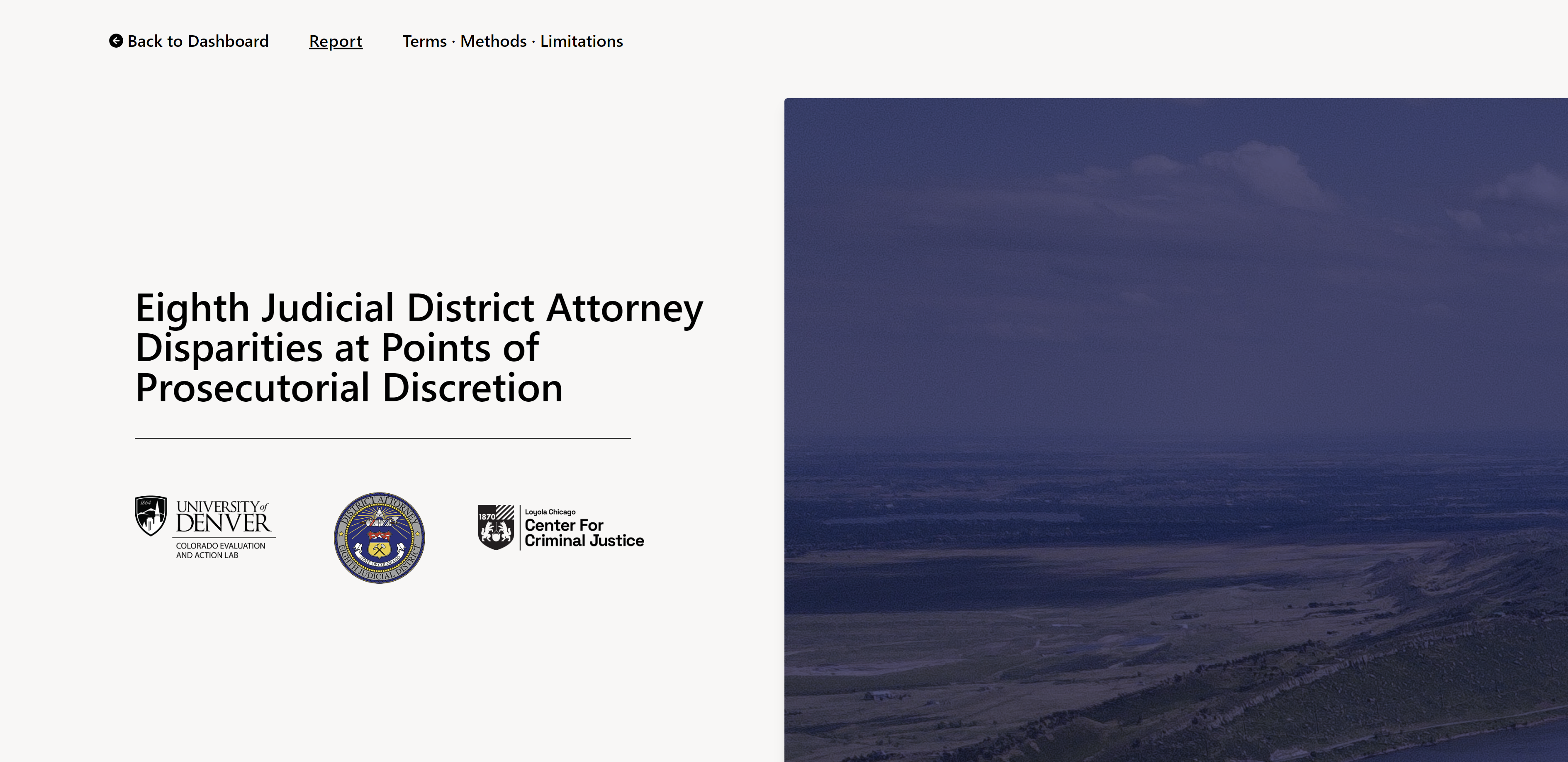The First Statewide Prosecutor Data Initiative in the United States
Prosecutors are expected to take proactive, engaged responses to community problems, reduce disparities in justice outcomes, build greater trust through community engagement, and increase prosecutorial transparency and accountability. The Colorado Prosecutorial Dashboards project works with prosecutors offices across the state to increase data-driven decision-making, raise awareness of disparities and support offices in addressing disparities, and increase engagement with and accountability to the public. Collectively, the 18 JDs participating in the project represent 52 of Colorado’s 64 counties—and provide data for 85% of the state’s population.
18 Jurisdictions Committed to Data and Innovation in Prosecution.
Explore data dashboards for each of the participating Judicial Districts by clicking on the map. We hope that giving communities access to information about case referrals, outcomes, and performance indicators will lead to greater accountability and improve the fairness and effectiveness of the criminal justice system.
18
Use Data to Drive Change
15
Released External Dashboards and Data Stories
8
Analyzed Racial and Ethnic Disparities in their Office
Data dashboards include information in eight areas: felony cases filed and declined; charging and filing; case resolution; diversion and deferrals; sentencing; defendant characteristics; victim characteristics and processes; staffing and caseloads.
The fair and just treatment of all communities at each stage of the criminal justice process is of significant importance. In Spring 2023, we completed analyses of racial/ethnic disparities at points of prosecutorial discretion, including felony declination, case disposition, charge reduction, and sentencing.
Using Data to Drive Action
The Colorado Prosecutorial Dashboards toolkit and Prosecutorial Performance Indicators support robust data-driven prosecutorial work.
Colorado Prosecutorial Dashboard Toolkit
The Colorado Prosecutorial Dashboards toolkit serves as a resource for Judicial Districts; it contains guidance and resources to support them in maintaining and using dashboards to support transparency and data-driven decision-making.
Prosecutorial Performance Indicators
The project is rooted in a national model, the Prosecutorial Performance Indicators Project (PPI), which has a menu of 55 indicators to measure performance toward three goals: capacity & efficiency, community safety & well-being, and fairness & justice. To learn more, visit www.theppis.org
Key Dates in the Colorado Prosecutorial Dashboards project
3 Years In; Project Sustainability
The work of the first three years wraps up. Ongoing management of the dashboards is transitioned to the Colorado District Attorney’s Council.
4 Dashboards Released
The 9th, 11th, 19th, and 22nd Judicial District publicly release their data dashboards.Read more here.
Capacity Building
The project implements a variety of strategies to build the capacity of Judicial Districts to review, interpret, and act on data, including hosting webinars, updating the toolkit, and facilitating cross-site learning meetings. Read more here.
5 Jurisdictions Join
Five new judicial districts join the project: the 9th, 11th, 13th, 19th, and 22nd. Read more here.
Equity Funding
The project receives funding from the Edward Byrne Memorial Justice Assistance Grant (JAG) Program and the Bureau of Justice Assistance (BJA) Smart Proescution Grant Solicitation to develop a tool to advance racial equity in prosecutorial decision-making
The Evaluation Center
The local research partner transitions from the Colorado Evaluation and Action Lab at DU to The Evaluation Center at CU Denver.
3 Dashboards Released; 2 Years In
The 12th, 17th, and 21st Judicial Districts publicly release their data dashboards. Read more about the work of the 12th, 17th, and 21st. The work of the first two years wraps up. Read more about the project’s influence along with lessons learned in the findings report.
8 Reports on Racial and Ethnic Disparities
Eight Judicial Districts release reports on racial and ethnic disparities at points of prosecutorial discretion. Read more in this story from CPR.
5 Jurisdictions Join
Five new Judicial Districts join the project: the 3rd, 10th, 12th, 17th, and 21st. Read more here.
8 Dashboards Released
The 1st, 2nd, 5th, 6th, 7th, 8th, 18th, and 20th Judicial Districts publicly release their data dashboards. Read more in this story from CPR and this story from the Associated Press.
Community Listening Session
The 1st, 2nd, 18th, and 20th Judicial Districts host a Denver metro area community listening session to understand the public’s thoughts and concerns around the role of prosecutors in Colorado. Read more here.
Capacity Building
The project completes foundational steps to assess the baseline capacity of Judicial Districts, build office-based workgroups, and identify priority data points. Read more here.
Funding from the Microsoft Justice Reform Initiative
The Microsoft Justice Reform Initiative awards funding to PPI and the Colorado Evaluation and Action Lab at the DU for the project.
Hear From Project Leaders
Hear From Project Leaders
Project Partners
This project is a partnership between Dr. Lauren Gase, Mindful Metrics; Dr. Don Stemen and Branden DuPont, the Center for Criminal Justice at Loyola University Chicago ; and Tuan Nguyen, the Colorado District Attorneys’ Council.
The project is rooted in a national model, the Prosecutorial Performance Indicators Project (PPI). To learn more, visit www.theppis.org. Thanks to the Microsoft Justice Reform Initiative for funding the catalytic work of the Colorado Prosecutorial Dashboards Project











